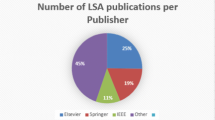Abstract
We study the multi-objective problem of mapping independent tasks onto a set of data center machines that simultaneously minimizes the energy consumption and response time (makespan) subject to the constraints of deadlines and architectural requirements. We propose an algorithm based on goal programming that effectively converges to the compromised Pareto optimal solution. Compared to other traditional multi-objective optimization techniques that require identification of the Pareto frontier, goal programming directly converges to the compromised solution. Such a property makes goal programming a very efficient multi-objective optimization technique. Moreover, simulation results show that the proposed technique achieves superior performance compared to the greedy and linear relaxation heuristics, and competitive performance relative to the optimal solution implemented in Linear Interactive and Discrete Optimizer (LINDO) for small-scale problems.
Similar content being viewed by others
References
Symantec corporation. Symantec state of the data center report, available online at: http://www.symantec.com/content/en/us/about/media/SOTDC_report_2007.pdf
United States air force satellite control network data, available online at: http://www.cs.colostate.edu/sched/index.html
Abdelzaher TF, Lu C (2001) Schedulability analysis and utilization bounds for highly scalable real-time services. In: 7th real-time technology and applications symposium, p 15
Bansal N, Kimbrel T, Pruhs K (2004) Dynamic speed scaling to manage energy and temperature. In: 45th annual IEEE symposium on foundations of computer science, pp 520–529
Bianchini R, Rajamony R (2004) Power and energy management for server systems. IEEE Comput 37(11):68–74
Bunde DP (2006) Power-aware scheduling for makespan and flow. In: 8th ACM symposium on parallelism in algorithms and architectures, pp 190–196
Chen J, Dubois M, Stenström P (2007) Simwattch: Integrating complete-system and user-level performance and power simulators. IEEE MICRO 27(4):34–48
Chung E-Y, Benini L, Bogiolo A, De Micheli G (1999) Dynamic power management for non-stationary service requests. In: Conference on design, automation and test in Europe, p 18
Dyer JS (1972) Interactive goal programming. Oper Res 19:62–70
Guzek M, Pecero JE, Dorronsoro B, Bouvry P, Khan SU (2010) A cellular genetic algorithm for scheduling applications and energy-aware communication optimization. In: International conference on high performance computing & simulation HPCS, pp 241–248
Heath T, Diniz B, Carrera EV, Meira W Jr, Bianchini R (2005) Energy conservation in heterogeneous server clusters. In: 10th ACM SIGPLAN symposium on principles and practice of parallel programming, pp 186–195
Hwang CL, Masud ASM (1979) Multiple objective decision making—methods and applications: A state-pf-the-art survey. Springer, Berlin
Irani S, Gupta R, Shukla S (2002) Competitive analysis of dynamic power management strategies for systems with multiple power savings states. In: Conference on design, automation and test in Europe, p 117
Khan SU (2009) A game theoretical energy efficient resource allocation technique for large distributed computing systems. In: International conference on parallel and distributed processing techniques and applications (PDPTA), pp 48–54
Khan SU (2009) A multi-objective programming approach for resource allocation in data centers. In: International conference on parallel and distributed processing techniques and applications (PDPTA), pp 152–158
Khan SU, Ahmad I (2009) A cooperative game theoretical technique for joint optimization of energy consumption and response time in computational grids. IEEE Trans Parallel Distrib Syst 20(3):346–360
Kliazovich D, Bouvry P, Khan SU (2010) DENS: Data center energy-efficient network-aware scheduling. In: ACM/IEEE international conference on green computing and communications (GreenCom), pp 69–75
Laplante PA (2004) Real-time system design and analysis. Wiley, New York
Li L, Lai KK (2000) A fuzzy approach to the multiobjective transportation problem. Comput Oper Res 27(1):43–57
Liang T-F (2008) Fuzzy multi-objective production/distribution planning decisions with multi-product and multi-time period in a supply chain. Comput Ind Eng 55(3):676–694
Lorch JR, Smith AJ (2001) Improving dynamic voltage scaling algorithms with pace. In: 2001 ACM SIGMETRICS international conference on measurement and modeling of computer systems, pp 50–61
Luenberger D (1984) Linear and nonlinear programming. Addison-Wesley, Reading
Mejia-Alvarez P, Levner E, Mossé D (2004) Adaptive scheduling server for power-aware real-time tasks. ACM Trans Embed Comput Syst 3(2):284–306
Nathuji R, Isci C, Gorbatov E (2007) Exploiting platform heterogeneity for power efficient data centers. In: 4th international conference on autonomic computing, p 5
Pinel F, Pecero J, Bouvry P, Khan SU (2010) Memory-aware green scheduling on multi-core processors. In: 39th IEEE international conference on parallel processing (ICPP), pp 485–488
Pinheiro E, Bianchini R, Carrera EV, Heath T (2001) Load balancing and unbalancing for power and performance in cluster-based systems. In: Workshop on compilers and operating systems for low power
Rusu C, Ferreira A, Scordino C, Watson A (2006) Energy-efficient real-time heterogeneous server clusters. In: 12th IEEE real-time and embedded technology and applications symposium, pp 418–428
Schrage L (1986) Linear, integer, and quadratic programming with LINDO. Scientific Press, South San Francisco
Stefanescu A, Stefanescu M (1984) The arbitrated solution for multi-objective convex programming. Rev Roum Math Pures Appl 29:593–598
Subrata R, Zomaya AY, Landfeldt B (2010) Cooperative power-aware scheduling in grid computing environments. J Parallel Distrib Comput 70(2):84–91
Wallenius J (1975) Comparative evaluation of some interactive approaches to multicriterion optimization. Manag Sci 21:1387–1396
Weiser M, Welch B, Demers A, Shenker S (1994) Scheduling for reduced cpu energy. In: 1st USENIX conference on operating systems design and implementation, p 2
Yu Y, Prasanna VK (2002) Power-aware resource allocation for independent tasks in heterogeneous real-time systems. In: 9th international conference on parallel and distributed systems, p 341
Zangiabadi M, Maleki HR (2007) Fuzzy goal programming for multiobjective transportation problems. J Appl Math Comput 24(1):449–460
Author information
Authors and Affiliations
Corresponding author
Rights and permissions
About this article
Cite this article
Khan, S.U., Min-Allah, N. A goal programming based energy efficient resource allocation in data centers. J Supercomput 61, 502–519 (2012). https://doi.org/10.1007/s11227-011-0611-7
Published:
Issue Date:
DOI: https://doi.org/10.1007/s11227-011-0611-7




